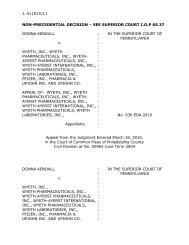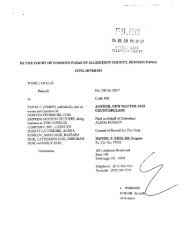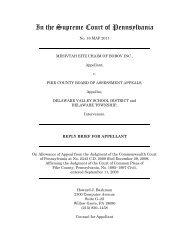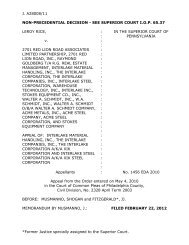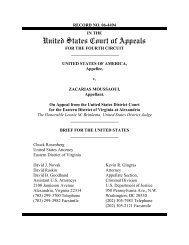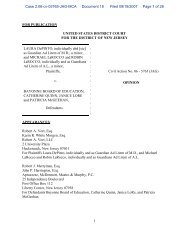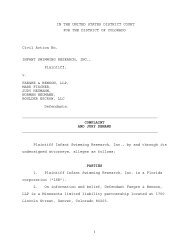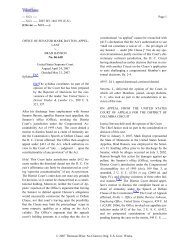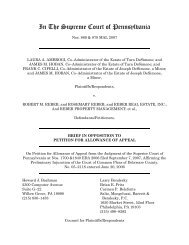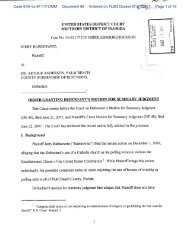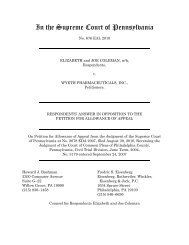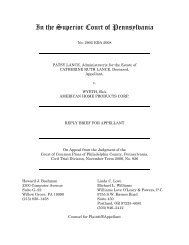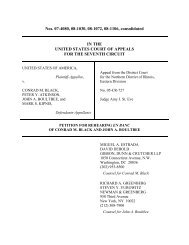Stone v. Bear, Stearns & Co., Inc. - How Appealing
Stone v. Bear, Stearns & Co., Inc. - How Appealing
Stone v. Bear, Stearns & Co., Inc. - How Appealing
You also want an ePaper? Increase the reach of your titles
YUMPU automatically turns print PDFs into web optimized ePapers that Google loves.
Case 2:11-cv-05118-LDD Document 22 Filed 05/29/12 Page 21 of 35<br />
D. Misbehavior Under 9 U.S.C. § 10(a)(3)<br />
<strong>Stone</strong> also asks us to vacate the award under Section 10(a)(3), which provides for vacatur<br />
“where the arbitrators were guilty of . . . any . . . misbehavior by which the rights of any party have<br />
been prejudiced.” Specifically, <strong>Stone</strong> argues that Marston misbehaved by failing to disclose potential<br />
conflicts and thus denied <strong>Stone</strong> the opportunity to remove her from the panel (or, presumably, to pick<br />
a different public arbitrator to begin with). We find this argument unconvincing.<br />
Preliminarily, we note the relative novelty of <strong>Stone</strong>’s position. The Second Circuit recently<br />
remarked that the court was unaware of any cases “that have addressed claims of insufficient<br />
[arbitrator] disclosure under the ‘other misbehavior’ prong.” STMicroelectronics, N.V. v. Credit<br />
9<br />
Suisse Sec. (USA) LLC, 648 F.3d 68, 74 (2d Cir. 2011). In theory, we do not see why<br />
“misbehavior” would categorically exclude instances of non-disclosure. See Positive Software<br />
Solutions, 476 F.3d at 288 (Reavley, J., dissenting) (commenting that “[i]t might . . . be said that an<br />
arbitrator who fails to make a significant disclosure is guilty of ‘misbehavior’” under § 10(a)(3)). But<br />
in practice, failures-to-disclose that would constitute “misbehavior” under Section 10(a)(3) would<br />
likely also reflect “evident partiality,” which Section 10(a)(2) already addresses. This might explain<br />
the dearth of case law on failure-to-disclose-type “misbehavior.”<br />
9<br />
<strong>Stone</strong> cites a 2012 unpublished order by a Southern District of Florida judge vacating an<br />
arbitration award under Section 10(a)(3)’s “misbehavior” prong for an arbitrator’s failure to disclose<br />
a conflict of interest. See Citigroup Global Markets, <strong>Inc</strong>. v. Berghorst, 11-cv-80250 (S.D. Fla. Jan.<br />
20, 2012) (Doc. No. 29). The Berghorst court only briefly addressed the § 10(a)(3) issue, citing no<br />
cases to support the court’s position. Additionally, Marston’s alleged non-disclosure pales in<br />
comparison to the arbitrator’s in Berghorst. In that case, the non-public FINRA arbitrator failed to<br />
disclose that he had been waging a heated legal battle against his former employer, Wells Fargo /<br />
Wachovia (a registered broker-dealer), for wrongful termination, among other things. Citigroup, also<br />
a registered broker-dealer, lost the arbitration with the challenged arbitrator casting the deciding vote.<br />
21



